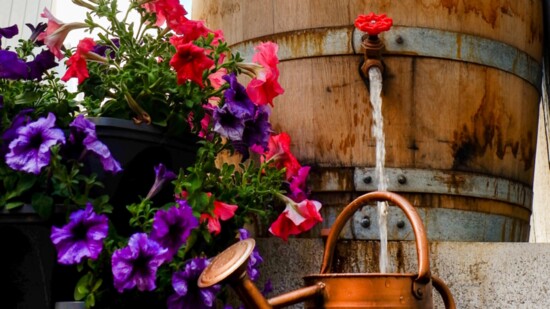Two thoughts might spring to mind when thinking about the term “green awakening.” Given the dramatic swings experienced with the weather, adopting a green way of living seems more sensible, and maybe you're already doing a few things that put you solidly on the path for a lower carbon lifestyle.
Rain Barrels Lower Water Consumption
Rain barrels capture water from roofs, holding it for later use on lawns, gardens or indoor plants. Collecting roof runoff reduces the water flowing away from your property. Outfitting a house with well-placed rain barrels can save money, helping cut utility costs, providing free water for gardening, lawn watering or even washing the car. Google “where to buy a rain barrel near me” and find scores of options under $100, whether online or at a local Home Depot or Tractor Supply.
Pro tip: Collect rainwater by diverting a downspout to a barrel. Position the barrel on a high spot — even an elevated deck — so gravity and a hose returns the water to your plants.
Solar Energy
Installing solar panels on a home is a surefire way to achieve carbon-free electricity production, but it doesn’t have to be a whole-house (all-in) proposition.
Solar panel kits can be used to provide power for an RV, boat, camper, or spot power for a gazebo or shed. A quick online search reveals a 400-watt solar panel system ($699) DIY setup to power lighting, an overhead fan and a stereo for a shed or gazebo.
Solar farms are another way to get the power of the sun without panels on a roof. Several local providers want subscribers for solar power produced nearby and released into the grid, thereby offsetting carbon-generated electricity. Again, a quick Google search reveals options that can save about 15% on energy costs without changing your relationship with ComEd to deliver the power to your home.
Reducing the Waste Stream
Composting has been around for a long time. Kitchen composting is relatively new; it’s important for several reasons, including reducing the waste stream (the garbage that’s sent to a landfill) and subsequent harmful methane gas emissions from those same landfills.
Getting started is easy and inexpensive. First, look for a seal-tight container for your kitchen. There are attractive ones for sale, but any large Tupperware-like container will do. Instead of tossing trimmings and peels from veggies and fruit down the disposal or into the garbage, store them in the container; when it’s full, transfer the organic materials (no fats, meat or packaging) to an outside composter or compost pile.
Composters vary, but have one thing in common – they come in basic black. Why? Have you ever gotten into a black car on a sunny day? A black composter absorbs heat, speeding decomposition of organic matter. An ideal composter has a simple crank allowing you to rotate a drum to help with decomposition. Compost in a sunny spot with good airflow in your backyard; in time you’ll have super-rich, nutrient-full, homemade compost to add to your flower beds and vegetable garden.
Grow Your Own
Speaking of veggies, even a small 8’ x 8’ plot can produce a nice crop of tomatoes, beans, peppers and herbs. No place for a garden? How about a collection of containers on a sunny deck? Some villages and gardening clubs have shared community gardening areas; check near you. Think about visiting or possibly joining a local gardening club: learn and socialize simultaneously.
Best of all, you can get your seeds for free. Several area libraries run seed banks with seeds shared by area gardeners. You’ll save a few bucks and know the seeds you plant have been tested locally by gardeners like you. Also, look for special events like Round Lake Beach Library’s annual Seed Expo; get a garden’s worth of free seeds and advice from local Master Gardeners.
Transitioning from flora to fauna: an increasing trend in local suburbs is raising chickens. There’s a bit of legwork to get started (local suppliers are ready to help you with gear and know-how), but nothing beats plucking fresh, healthy eggs straight from the hen's nest for breakfast. (Note photo of celebrity chef Fabio Viviani nuzzling his favorite hen, Red, near his home chicken coop).
Upcycling Gives Discards New Purpose
If you haven’t heard about upcycling... listen up! So many ways, so many things.
In keeping with the gardening theme, cardboard egg cartons and eggshells are a perfect way to germinate seeds for your garden. Crack eggs carefully so just over two-thirds of the shell remains intact. From a small bag of purchased seed-starter mix, fill the eggshells, bury a few seeds in each, place in an egg carton, keep watered and put in a sunny spot indoors; within a few days you’ll see sprouts. Mark each shell with what you’ve planted. Once we’ve had a week of warm days, transfer the plants to your garden or containers. Crush the eggshell and plant it, too, for extra nutrients as your plants take root.
Donate things you have but no longer need or treasure, for others to discover, repurpose, and enjoy. Your “old/out-of-style” is someone else’s “vintage/just my style!” After freeing some of your extra stuff, find new treasures at outstanding, unique local upcyclers like Lake Barrington’s All American Retail, or ABLE Shoppe just down the road in Elgin, where furniture and fashion become art.










